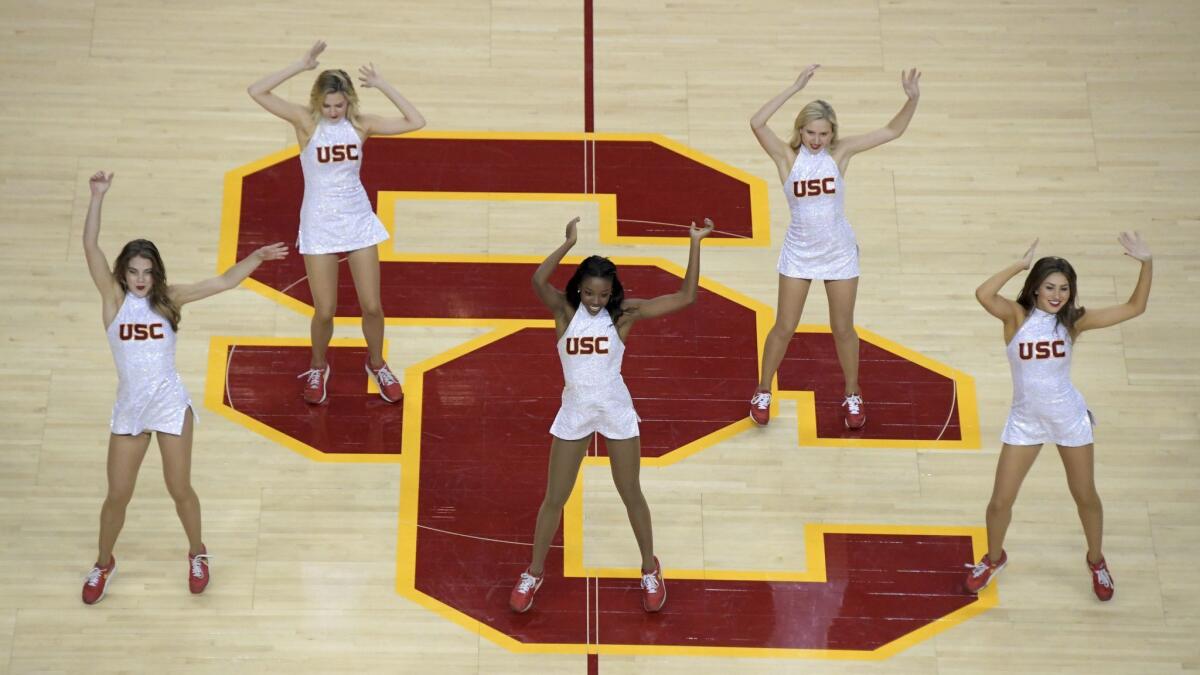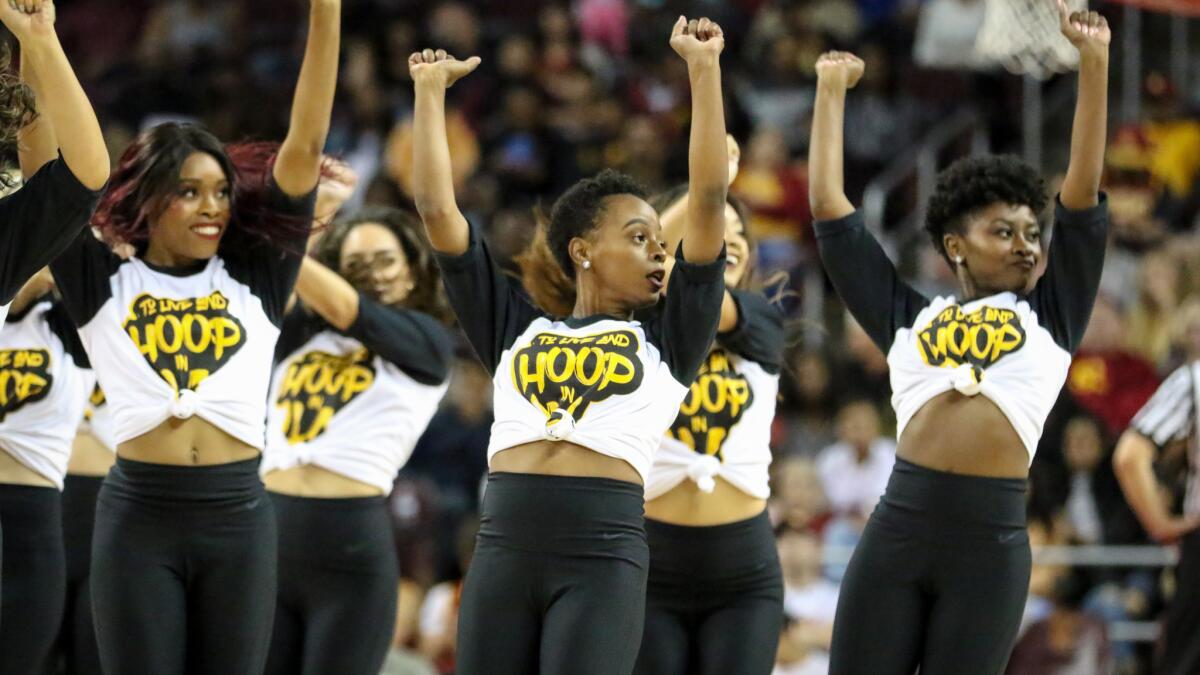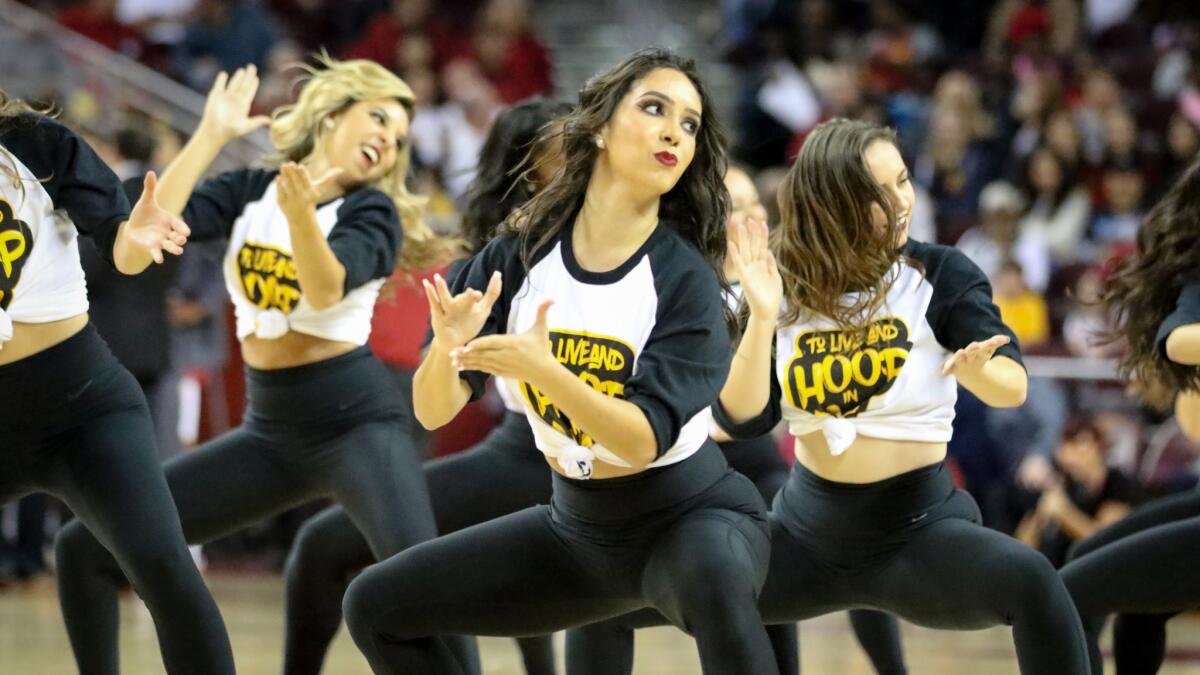When the cheering stopped: USC’s Song Girls shut out at home basketball games

Lynn Swann had a busy fall. It seemed everybody wanted him to fire the head football coach.
Even though USC had a losing season, and even though fans were so determined to be heard they paid for a banner to fly over the Coliseum that pleaded with him to send Clay Helton packing, Swann listened to his gut and kept Helton in place.
For a college athletic director, decisions don’t get any bigger or bolder than that. Yet, in the midst of such high drama in athletics — and all over campus in the aftermath of several reputation-damaging scandals — another matter had grabbed Swann’s attention:
What was he going to do about having two groups of cheerleaders at Trojans men’s and women’s basketball games?
On one side of the court were the USC Song Girls, the 12-woman spirit group that — just as much if not more than the Trojans football team — is synonymous with the USC brand around the world. The white sweaters. The cardinal and gold pompoms. The red shoes. No matter what one may think of USC, most everyone can conjure an image of the Song Girls, a group founded 50 years ago to cheer for the basketball team and is also a fixture at Trojans football games.
On the other side was the Trojan Dance Force, created by athletics in 1994 because the Trojan Marching Band did not want the Song Girls dancing to piped-in music. They wanted the Song Girls exclusively tied to their tunes at USC basketball games. Dance Force entered the fray, at first dancing only to canned hip-hop music and staying far away from any infringement over the Song Girls’ role. Essentially, they were USC’s version of the Laker Girls, and there was room for everyone — until, suddenly, there wasn’t.
Just days after his controversial choice to retain Helton in late November, Swann signed his name to a decision that was far less public but perhaps harder to explain: He removed the Song Girls from USC home basketball games for the rest of the 2018-19 season.

On Dec. 1, for the first time since 1968, when the Trojans men hosted Nevada, there were no Song Girls at the Galen Center. And Saturday afternoon, when USC hosts crosstown rival UCLA for a game that will be broadcast nationally on CBS, they will still be absent from the arena, despite a persistent outcry by Song Girl alumni, athletic donors and parents of current Song Girls who can’t fathom why USC would take away opportunities for students to do something they love.
“I don’t feel I’ve gotten an adequate explanation,” said Hilary Hodgkins, the Song Girls’ alumni advisor, “and when I ask, I get stonewalled.
“I don’t understand it. I wish I could answer this question: For the life of me, it makes no sense to me why athletics is even worried about a dance team.”
Word quickly circulated among the 280 former Song Girls. They wanted answers and said they were not offered any believable ones from Heritage Hall. Lauren Chespak, the captain of the 2007 Song Girls, emailed a letter Jan. 11 to interim USC President Wanda Austin, Swann’s boss.
“The lack of discourse, the absence of explanation and the ‘closed door’ atmosphere of USC Athletics is unfamiliar and frankly disconcerting,” Chespak wrote. “Why?
“The beautiful tradition of USC Trojan Athletics and its resultant success cannot possibly have been realized by mistake OR by looking the other way, sidestepping and disregarding the family fabric it took us decades to develop.”
Chespak’s email moved through the channels from Austin’s office to Swann’s. On Monday, she received a response from Monica Morita, executive assistant to Swann, saying, “Below is a letter from Mr. Swann.” That letter began, “Lauren, I understand your concern. The Song Girls have a great tradition and that will continue,” and then included wording from a news release that had been sent to anyone who inquired about the Song Girls’ absence.
“Due to ongoing game management concerns,” the statement read, “time constraints and space issues at the Galen Center, the USC Song Girls will not perform at the remaining men’s and women’s basketball games for the 2018-19 season.
“USC Athletics and the Division of Student Affairs jointly made the decision after trying various options over multiple years to accommodate both the Song Girls and the Trojan Dance Force, which was established in 1994 to support USC basketball, at the arena.”
Contacted this week, a USC spokesman referred the Los Angeles Times to the same statement.

Hodgkins met with Swann in person a year ago because she was concerned that the Song Girls were not getting enough performance time at basketball games. She was told that a solution would be worked out but that more marketing opportunities were happening at games, which limited performance time.
“I’ve been going to USC sports since I was 2,” Hodgkins, 56, said, “and it just keeps getting more corporate and more corporate and more corporate, and it’s difficult. The university is steeped in tradition and the Song Girls are part of that tradition.”
Hodgkins, a Trojan Athletic Fund member and season-ticket holder, had purchased a large group of tickets for last year’s football homecoming game Nov. 10, which was a celebration of the Song Girls’ 50th anniversary. Last week, an employee of the USC athletic ticket office reached out to her wondering if she wanted to buy a block for basketball. She decided that, given what had happened, the UCLA game would be a perfect time to get 50 former Song Girls together and go to Galen proudly wearing their white sweaters.
But Hodgkins said the employee called her back and said he had been told by a superior that he could not sell her the seats after all. USC routinely struggles with attendance at Galen, and now they were turning down the purchase of 50 tickets?
“What does that tell you?” she said.
Hodgkins reached out to a contact higher up in the athletic department who expressed surprise a loyal donor would be refused tickets. She said she later was told that the athletic department thought the Song Girl alums wanted to perform at the game as they had at the football homecoming game. Hodgkins didn’t know where they would have gotten that idea. She was offered tickets but was asked not to wear Song Girl attire.
After that confusing back-and-forth, Hodgkins decided it wasn’t in the group’s best interest or in line with its ethos to attend a game together this year.
“The Song Girls have always been the epitome of class,” Hodgkins said. “We are not going to do it, because that’s reverse bullying. All we’d be doing is bullying them back. That’s not who we are.”
The athletic department has heard from disgruntled donors who are flummoxed by Swann’s decision to sign off on the removal of the Song Girls.
“I view it as something that’s symptomatic of a much greater problem,” said a USC donor and basketball season-ticket holder who spoke on the condition of anonymity due to fear of retaliation. “They don’t listen to anybody. They’re arrogant. They operate in a bubble. They take for granted that people will keep showing up and keep donating.”
Sign up for our Lakers newsletter »
The mother of a current Song Girl echoed that sentiment.
“I know that this story is probably insignificant in a lot of ways,” said the mother, who spoke on the condition of anonymity due to fear of retribution toward her daughter. “To me, it’s really indicative of what’s going on at the university, just decisions being made that are just hard to understand.”
The Song Girls, like the university they represent, are full of traditions. One is that the graduating seniors have their farewell performance at the home UCLA basketball game, handing over the figurative baton to next year’s group. Sophie Rebeil, the 2018 captain of the Song Girls, and her fellow seniors instead shared their last dance Nov. 28 in a lowly attended game against Long Beach State.
“I didn’t know that was my last time ever performing,” said Rebeil, a business major. “I feel like it would have been great closure. You always kind of want one last memory to end it on.”
The timeless image of the Song Girl was enough to make 10-year-old Sophie, growing up in Laguna Beach, dream of becoming one. As a first-generation college student, accomplishing that goal of making the team had been the defining part of her young life.
She relished the 40-hour work weeks just as much as the rewarding trips to USC road football games and bowl games. Basketball was always fun, too, but she could not deny things had gotten weird at the Galen Center, particularly this season.
Over the last few years, Rebeil could see that the athletic department was going for more of an NBA vibe with the game experience. A DJ played canned hip-hop and popular music from the student section and yelled commands at the crowd. Each game in the second half, the DJ, “DJ Mal-Ski,” asks as part of a promotion “Who wants Chick-fil-A?” to get fans to make noise as the opposing team shoots free throws.
Then there was the reality of two spirit squads competing for less available court time. While some Song Girl alumni saw the Dance Force as testing the limits of the teams’ agreed-upon defined roles at the games, Rebeil did not see it that way.
“I respect them so much,” Rebeil said. “They are students, they are women, they are performers, and they want the exact same thing we do. They want to go out there and represent the university and put smiles on people’s faces.
“Both teams don’t know what’s going on. It’s well above us. It’s kind of sad almost. It seems so much like we’re pitted against each other. It’s kind of prehistoric, pitting two women teams against each other. It should be that we’re female students who are empowering other female students.”
At the season-opening doubleheader for women’s basketball and men’s basketball Nov. 6, the Song Girls were met with the news that they would no longer cheer from the baseline of the court but behind the basket and in front of the students on a concrete walkway. Rebeil said cheering on the concrete for five to six hours hurt their backs.
From there, further tweaks to the game day plan were attempted. But ultimately, the athletic department and USC Student Affairs, which oversees the Song Girls, were unable come up with a compromise.
“I would like to see some greater communication between the athletic department and the USC Song Girls,” said Charlene Zettel, a founding member of the Song Girls in 1968.
“And I would hope that the university recognizes that when young people put their hearts into participating in an athletic program or these spirit programs that there are so many lessons learned and they’re life-changing. So don’t minimize these opportunities. Celebrate them.”
Twitter: @BradyMcCollough
More to Read
Go beyond the scoreboard
Get the latest on L.A.'s teams in the daily Sports Report newsletter.
You may occasionally receive promotional content from the Los Angeles Times.







